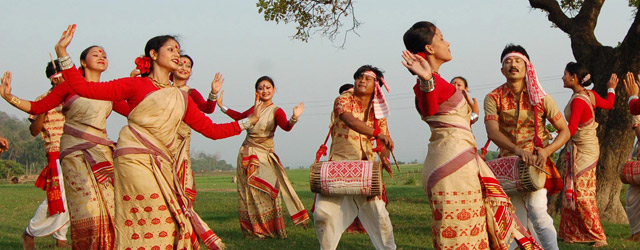Bihu, the national festival of Assam is celebrated in an elaborate way. There are three Bihu festivals ‘BohagBihu’, ‘KongaliBihu’ and ‘BhogaliBihu’. Each of the three Bihu festivals has its own significance and is celebrated with its own traditions. Celebrated by the Assamese, this set of 3 festivals represents three different cultural beliefs.
KongaliBihu is also called Kati Bihu. It is usually celebrated midway in October and the celebration is quiet when compared with the other two Bihu festivals. It is observed on the first calendar day of ‘Kati’ month in Assamese calendar. The name “kogali” means poor indicating barns are empty and there is limited availability of food. At this time of the year paddy grows in field and farmers pray to God for a good harvest.
Goddess Laxmi is known to bring prosperity at home and she is worshipped by women particularly. Diyas, candles or lamps are lighted in the evening and placed at various places including paddy fields. A lamp is also lit in front of the Tulsi plant which is the most sacred plant in Hindus. The lamps lit in paddy fields are kept high on bamboos so that insects fall prey to these lamps keeping the crops healthy. Lighting lamps on high bamboos also has the superstition belief that states – showing the path of heaven to the spirits of ancestors who has come to give their blessings. These lamps on bamboo are referred to as “Akaxbonti” in Assamese.
There is enthusiasm and vigour is Bihu celebration but the Kati Bihu significance lies in offering prayers to the God for a good harvest. This is the only Bihu where cultivators think about the practical reality. They are concerned about the rice sapling harvest since, good harvest will bring prosperity to home. Kati Bihu has typically more religious values as it entirely revolve offering prayers in various forms.
Simplicity is the key when celebrating Kati Bihu. As mentioned above the significance Kati Bihu is offering prayers hence it is restricted to simple and homely celebration. The family celebrating Kati Bihu has a feeling of solemnity and they understand the bitter truth of empty granaries. Though celebrated with less merriment the importance of Kati Bihu is not limited as it marks that crops would yield very soon and happiness is on the way. The integrity and respect is maintained throughout the celebration of Kati Bihu.









